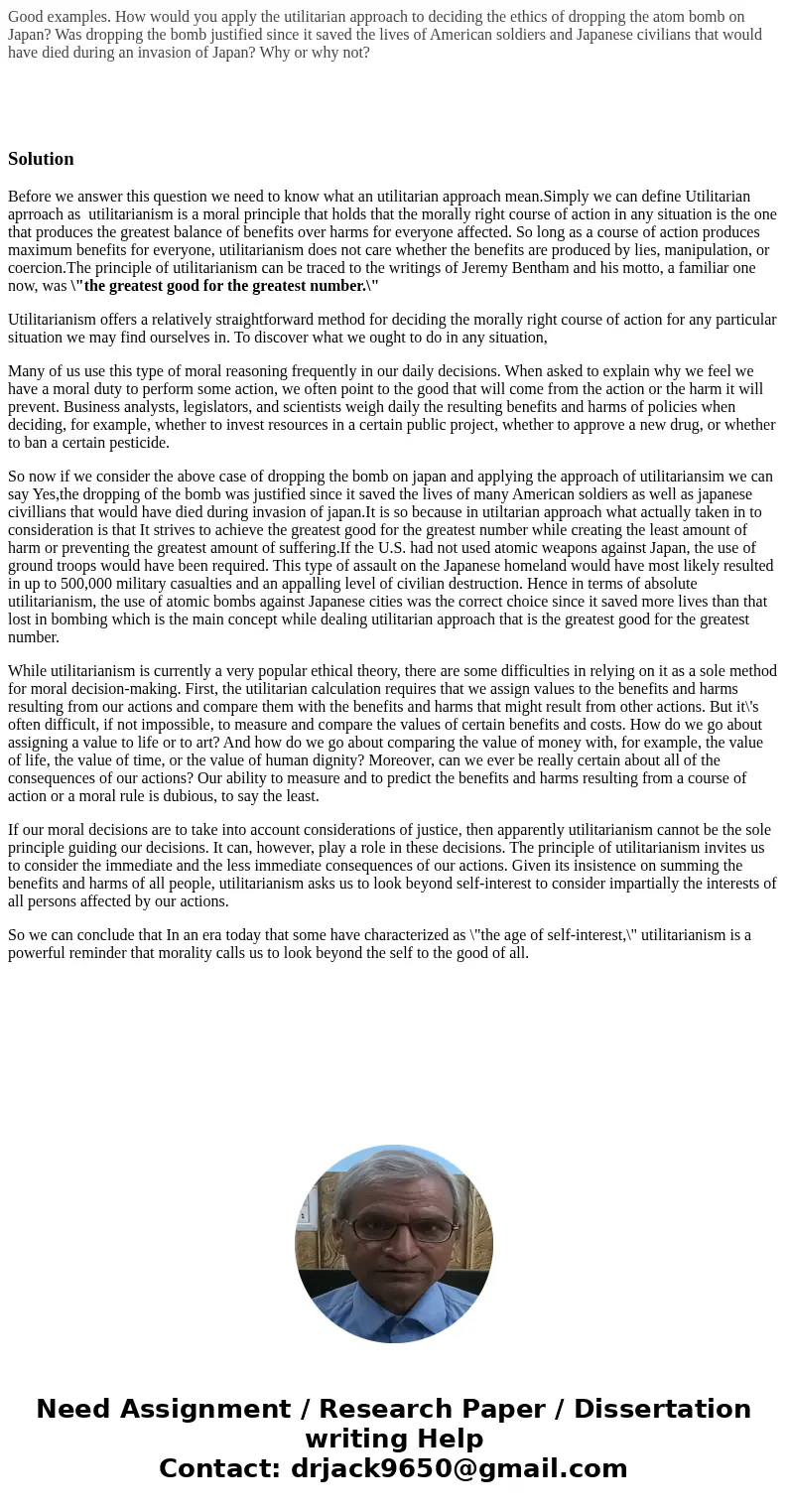Good examples How would you apply the utilitarian approach t
Good examples. How would you apply the utilitarian approach to deciding the ethics of dropping the atom bomb on Japan? Was dropping the bomb justified since it saved the lives of American soldiers and Japanese civilians that would have died during an invasion of Japan? Why or why not?
Solution
Before we answer this question we need to know what an utilitarian approach mean.Simply we can define Utilitarian aprroach as utilitarianism is a moral principle that holds that the morally right course of action in any situation is the one that produces the greatest balance of benefits over harms for everyone affected. So long as a course of action produces maximum benefits for everyone, utilitarianism does not care whether the benefits are produced by lies, manipulation, or coercion.The principle of utilitarianism can be traced to the writings of Jeremy Bentham and his motto, a familiar one now, was \"the greatest good for the greatest number.\"
Utilitarianism offers a relatively straightforward method for deciding the morally right course of action for any particular situation we may find ourselves in. To discover what we ought to do in any situation,
Many of us use this type of moral reasoning frequently in our daily decisions. When asked to explain why we feel we have a moral duty to perform some action, we often point to the good that will come from the action or the harm it will prevent. Business analysts, legislators, and scientists weigh daily the resulting benefits and harms of policies when deciding, for example, whether to invest resources in a certain public project, whether to approve a new drug, or whether to ban a certain pesticide.
So now if we consider the above case of dropping the bomb on japan and applying the approach of utilitariansim we can say Yes,the dropping of the bomb was justified since it saved the lives of many American soldiers as well as japanese civillians that would have died during invasion of japan.It is so because in utiltarian approach what actually taken in to consideration is that It strives to achieve the greatest good for the greatest number while creating the least amount of harm or preventing the greatest amount of suffering.If the U.S. had not used atomic weapons against Japan, the use of ground troops would have been required. This type of assault on the Japanese homeland would have most likely resulted in up to 500,000 military casualties and an appalling level of civilian destruction. Hence in terms of absolute utilitarianism, the use of atomic bombs against Japanese cities was the correct choice since it saved more lives than that lost in bombing which is the main concept while dealing utilitarian approach that is the greatest good for the greatest number.
While utilitarianism is currently a very popular ethical theory, there are some difficulties in relying on it as a sole method for moral decision-making. First, the utilitarian calculation requires that we assign values to the benefits and harms resulting from our actions and compare them with the benefits and harms that might result from other actions. But it\'s often difficult, if not impossible, to measure and compare the values of certain benefits and costs. How do we go about assigning a value to life or to art? And how do we go about comparing the value of money with, for example, the value of life, the value of time, or the value of human dignity? Moreover, can we ever be really certain about all of the consequences of our actions? Our ability to measure and to predict the benefits and harms resulting from a course of action or a moral rule is dubious, to say the least.
If our moral decisions are to take into account considerations of justice, then apparently utilitarianism cannot be the sole principle guiding our decisions. It can, however, play a role in these decisions. The principle of utilitarianism invites us to consider the immediate and the less immediate consequences of our actions. Given its insistence on summing the benefits and harms of all people, utilitarianism asks us to look beyond self-interest to consider impartially the interests of all persons affected by our actions.
So we can conclude that In an era today that some have characterized as \"the age of self-interest,\" utilitarianism is a powerful reminder that morality calls us to look beyond the self to the good of all.

 Homework Sourse
Homework Sourse